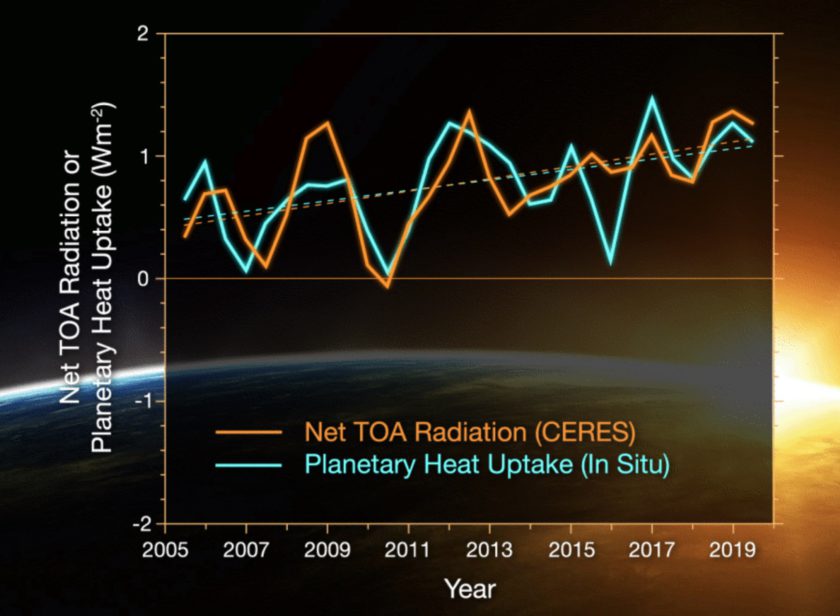Rather obviously a great deal of radiative energy comes from the sun and hits the earth. A proportion is absorbed. The earth also emits infrared radiation into space. It is the balance between these that determines our climate. Right now we have a positive energy imbalance. This means that we are gaining energy and heating up.
In the 14 years since 2005, this positive energy imbalance has doubled. Here is an illustration …

On June 15, 2021, the details of a joint NASA / NOAA study into this was published in AGU
Study: Satellite and Ocean Data Reveal Marked Increase in Earth’s Heating Rate
There they explain it as follows …
Climate is determined by how much of the sun’s energy the Earth absorbs and how much energy Earth sheds through emission of thermal infrared radiation. Their sum determines whether Earth heats up or cools down. Continued increases in concentrations of well-mixed greenhouse gasses in the atmosphere and the long time-scales time required for the ocean, cryosphere, and land to come to thermal equilibrium with those increases result in a net gain of energy, hence warming, on Earth. Most of this excess energy (about 90%) warms the ocean, with the remainder heating the land, melting snow and ice, and warming the atmosphere.
Here we compare satellite observations of the net radiant energy absorbed by Earth with a global array of measurements used to determine heating within the ocean, land and atmosphere, and melting of snow and ice. We show that these two independent approaches yield a decadal increase in the rate of energy uptake by Earth from mid-2005 through mid-2019, which we attribute to decreased reflection of energy back into space by clouds and sea-ice and increases in well-mixed greenhouse gases and water vapor.
Are they sure about this?
Very much so. Via two completely independent ways of measuring this, they get the same result.
What does this mean?
The quick summary is this. If we do nothing then we as a species are in serious trouble.
The positive energy imbalance means a lot more energy is now being pumped into the system. Remember, this has doubled since 2005.
The “symptoms” will be the obvious. Ocean warming, intensification of the hydrological cycle, and of course sea level rise.
Side note: You don’t need to melt ice to raise sea level, simply warming the ocean will do it. As water get warmer it expands. Well yes, rather a lot of ice is also melting as well.
The implication here is that by pouring more and more energy into the climate system the result will be far greater changes.
NASA Press Release – This is Alarming and Unprecedented
They lay it all out as honestly as possible …
Increases in emissions of greenhouse gases such as carbon dioxide and methane due to human activity trap heat in the atmosphere, capturing outgoing radiation that would otherwise escape into space. The warming drives other changes, such as snow and ice melt, and increased water vapor and cloud changes that can further enhance the warming. Earth’s energy imbalance is the net effect of all these factors. In order to determine the primary factors driving the imbalance, the investigators used a method that looked at changes in clouds, water vapor, combined contributions from trace gases and the output of light from the Sun, surface albedo (the amount of light reflected by the Earth’s surface), tiny atmospheric particles called aerosols, and changes in surface and atmospheric temperature distributions.
The study finds that the doubling of the imbalance is partially the result an increase in greenhouse gases due to human activity, also known as anthropogenic forcing, along with increases in water vapor are trapping more outgoing longwave radiation, further contributing to Earth’s energy imbalance. Additionally, the related decrease in clouds and sea ice lead to more absorption of solar energy.
The researchers also found that a flip of the Pacific Decadal Oscillation (PDO) from a cool phase to a warm phase likely played a major role in the intensification of the energy imbalance. The PDO is a pattern of Pacific climate variability. Its fingerprint includes a massive wedge of water in the eastern Pacific that goes through cool and warm phases. This naturally occurring internal variability in the Earth system can have far-reaching effects on weather and climate. An intensely warm PDO phase that began around 2014 and continued until 2020 caused a widespread reduction in cloud coverage over the ocean and a corresponding increase in the absorption of solar radiation.
“It’s likely a mix of anthropogenic forcing and internal variability,” said Loeb. “And over this period they’re both causing warming, which leads to a fairly large change in Earth’s energy imbalance. The magnitude of the increase is unprecedented.”
Loeb cautions that the study is only a snapshot relative to long-term climate change, and that it’s not possible to predict with any certainty what the coming decades might look like for the balance of Earth’s energy budget. The study does conclude, however, that unless the rate of heat uptake subsides, greater changes in climate than are already occurring should be expected.
Should we be worried?
I really don’t need to answer that for you, because the above observational evidence spells it all out.
What is clear is that the business as usual do nothing option is really not an option, it never has been.
